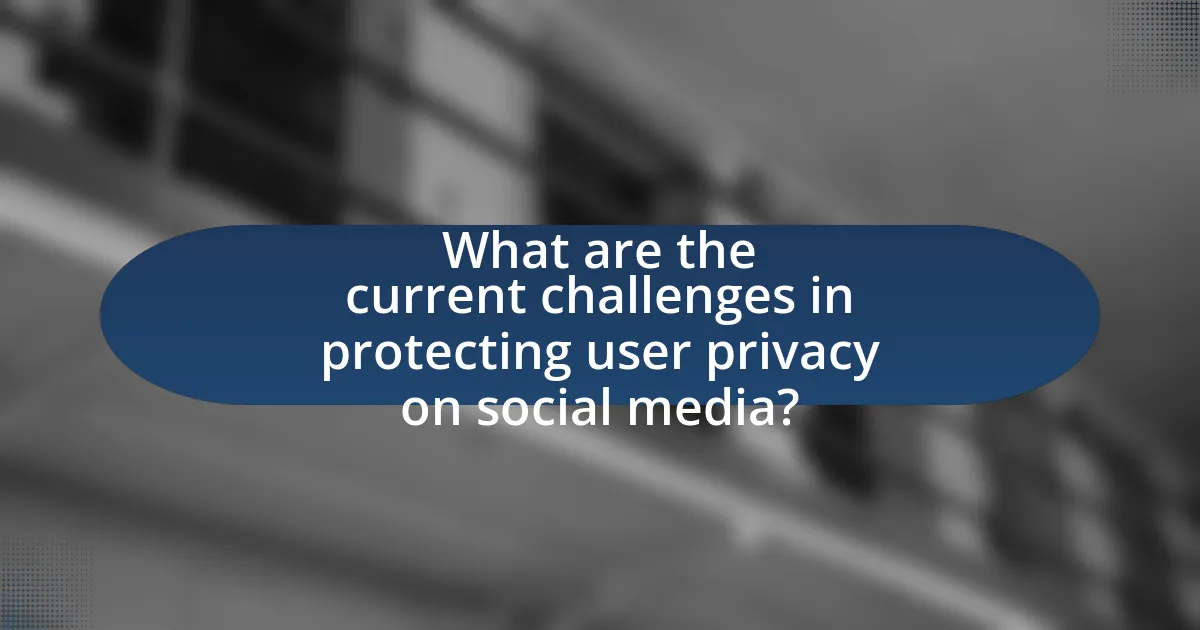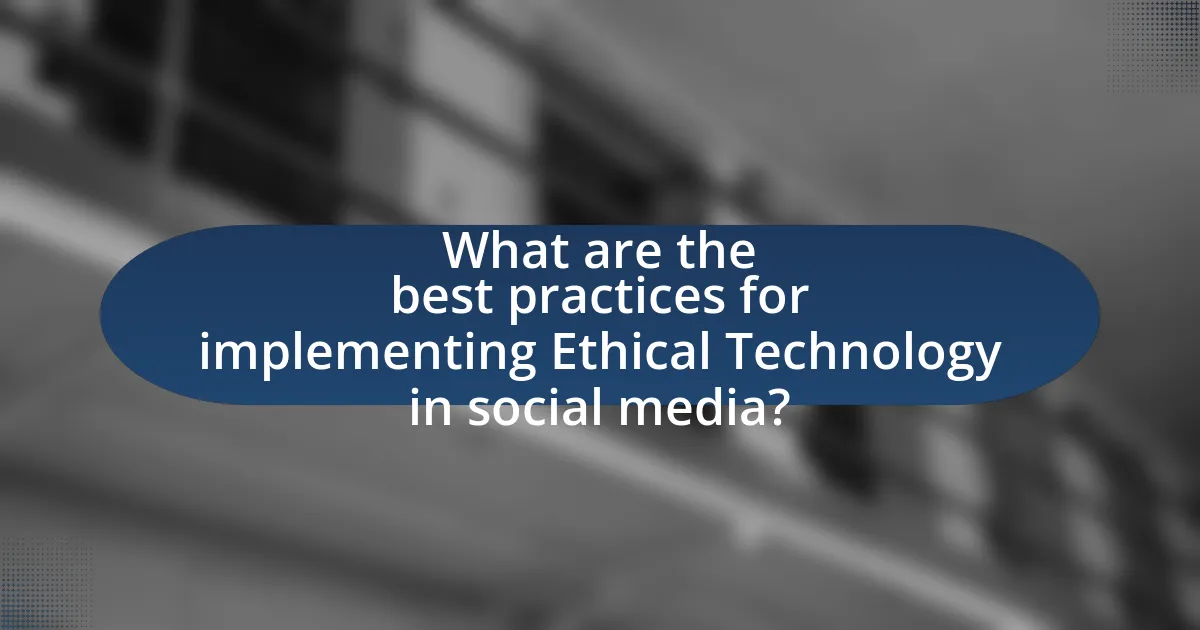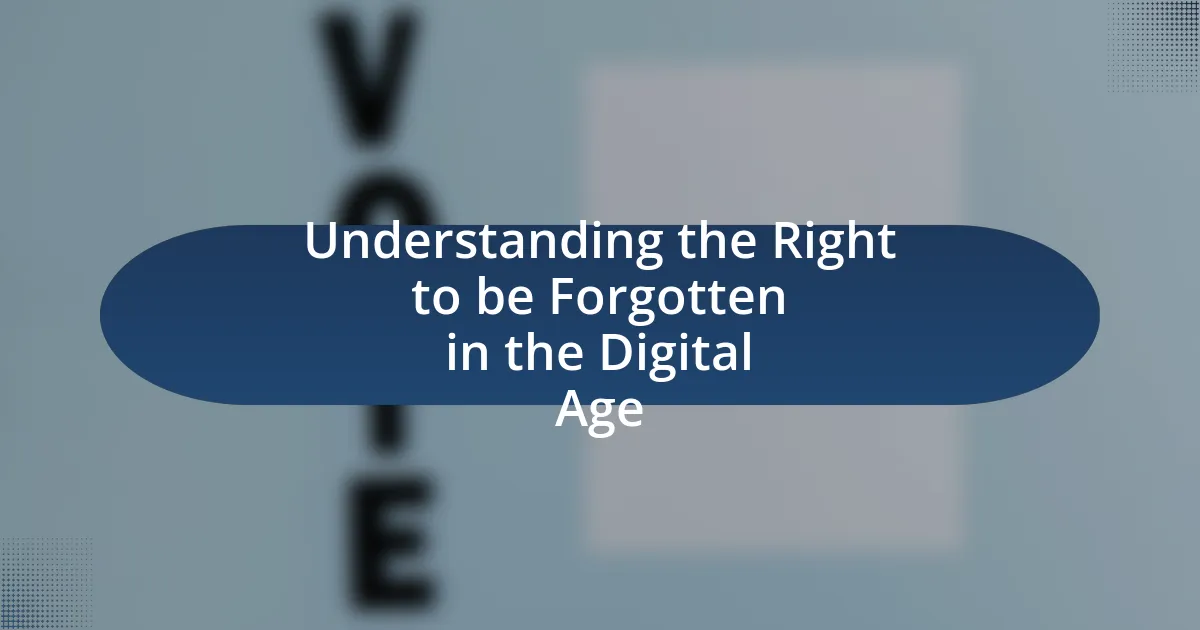Ethical technology in social media focuses on creating digital platforms that prioritize user privacy, data protection, and responsible content management. This article explores the principles of ethical technology, including transparency, accountability, and fairness, and their application to social media platforms. It addresses the importance of user privacy, the risks associated with poor privacy practices, and the role of regulations like GDPR in safeguarding user data. Additionally, the article highlights best practices for implementing ethical technology, current challenges in protecting user privacy, and future trends that may impact privacy practices in the digital landscape.

What is Ethical Technology in Social Media?
Ethical technology in social media refers to the design and implementation of digital platforms that prioritize user privacy, data protection, and responsible content management. This approach emphasizes transparency in data usage, informed consent from users, and the minimization of harm through algorithms that avoid promoting misinformation or harmful content. For instance, companies like Facebook and Twitter have faced scrutiny for their data handling practices, leading to calls for stricter regulations and ethical guidelines to safeguard user information. Research indicates that 79% of users are concerned about how their data is used, highlighting the demand for ethical standards in technology.
How does Ethical Technology influence user privacy?
Ethical technology significantly influences user privacy by prioritizing transparency, data protection, and user consent in digital interactions. This approach ensures that users are informed about how their data is collected, used, and shared, fostering trust between users and technology providers. For instance, regulations like the General Data Protection Regulation (GDPR) mandate that companies obtain explicit consent from users before processing their personal data, thereby enhancing user control over their information. Additionally, ethical technology practices advocate for minimizing data collection to only what is necessary, reducing the risk of data breaches and misuse. Studies have shown that companies adopting ethical technology frameworks experience higher user satisfaction and loyalty, as users feel more secure knowing their privacy is respected.
What are the key principles of Ethical Technology?
The key principles of Ethical Technology include transparency, accountability, privacy, and fairness. Transparency ensures that users understand how their data is collected and used, fostering trust. Accountability mandates that organizations take responsibility for their technology’s impact on society, including ethical implications. Privacy emphasizes the protection of user data and consent, aligning with regulations like GDPR. Fairness involves creating technology that does not discriminate against any group, promoting inclusivity. These principles are essential for guiding the development and implementation of ethical practices in technology, particularly in social media, where user privacy is paramount.
How do these principles apply to social media platforms?
The principles of ethical technology, particularly regarding user privacy, apply to social media platforms by mandating transparency, user consent, and data protection. Social media companies must clearly communicate how user data is collected, used, and shared, ensuring that users have the ability to provide informed consent. For instance, regulations like the General Data Protection Regulation (GDPR) in Europe require platforms to obtain explicit consent from users before processing their personal data, reinforcing the importance of user autonomy and privacy rights. Additionally, social media platforms are responsible for implementing robust security measures to protect user data from breaches, as evidenced by incidents like the Facebook-Cambridge Analytica scandal, which highlighted the consequences of inadequate data protection practices.
Why is user privacy important in social media?
User privacy is crucial in social media because it safeguards individuals’ personal information from misuse and exploitation. Protecting user privacy helps maintain trust between users and platforms, as breaches can lead to identity theft, harassment, and unauthorized data sharing. According to a 2021 survey by the Pew Research Center, 79% of Americans expressed concern about how their data is used by social media companies, highlighting the widespread demand for privacy protection. Furthermore, regulations like the General Data Protection Regulation (GDPR) in Europe emphasize the importance of user consent and data protection, reinforcing the ethical responsibility of social media platforms to prioritize user privacy.
What are the risks associated with poor privacy practices?
Poor privacy practices expose individuals and organizations to significant risks, including data breaches, identity theft, and loss of consumer trust. Data breaches can lead to unauthorized access to sensitive information, resulting in financial loss and reputational damage. For instance, the 2017 Equifax breach compromised the personal data of approximately 147 million people, highlighting the severe consequences of inadequate privacy measures. Identity theft can occur when personal information is mishandled, leading to fraudulent activities that can devastate victims financially and emotionally. Furthermore, organizations that fail to protect user privacy may experience a decline in customer loyalty, as studies show that 79% of consumers are concerned about how their data is being used. These risks underscore the critical importance of implementing robust privacy practices in the digital landscape.
How can user privacy impact user trust and engagement?
User privacy significantly impacts user trust and engagement by influencing how individuals perceive the safety of their personal information. When users feel that their privacy is respected and protected, they are more likely to trust the platform, leading to increased engagement. According to a 2021 survey by the Pew Research Center, 81% of Americans feel that the potential risks of companies collecting their personal data outweigh the benefits, highlighting the importance of privacy in fostering trust. Furthermore, platforms that prioritize user privacy often see higher retention rates, as users are more inclined to engage with services that safeguard their data.

What are the current challenges in protecting user privacy on social media?
Current challenges in protecting user privacy on social media include data breaches, inadequate privacy policies, and the pervasive use of surveillance technologies. Data breaches have become increasingly common, with high-profile incidents exposing millions of users’ personal information, such as the Facebook-Cambridge Analytica scandal, which highlighted the risks associated with third-party data access. Inadequate privacy policies often fail to inform users about how their data is collected, used, and shared, leading to a lack of transparency and user consent. Additionally, the use of surveillance technologies by both social media companies and governments raises significant concerns about user tracking and data misuse, as evidenced by reports from organizations like the Electronic Frontier Foundation, which emphasize the need for stronger regulations to safeguard user privacy.
How do data breaches affect user privacy?
Data breaches significantly compromise user privacy by exposing personal information to unauthorized parties. When a data breach occurs, sensitive data such as names, addresses, social security numbers, and financial information can be accessed and misused by cybercriminals. For instance, the 2017 Equifax breach affected approximately 147 million individuals, leading to increased risks of identity theft and fraud. This breach highlighted the vulnerabilities in data security practices and the potential for long-term impacts on user privacy, as affected individuals may face ongoing threats to their personal information.
What are the most common types of data breaches in social media?
The most common types of data breaches in social media include account hacking, data scraping, and third-party app vulnerabilities. Account hacking occurs when unauthorized individuals gain access to user accounts, often through phishing or credential stuffing, leading to identity theft and unauthorized actions. Data scraping involves the automated extraction of user data from public profiles, which can be exploited for malicious purposes. Third-party app vulnerabilities arise when external applications connected to social media platforms have security flaws, allowing attackers to access sensitive user information. According to a report by the Identity Theft Resource Center, social media platforms have consistently ranked among the top sectors for data breaches, highlighting the prevalence and impact of these security issues.
How can users protect themselves from data breaches?
Users can protect themselves from data breaches by implementing strong, unique passwords for each account and enabling two-factor authentication. Strong passwords should be at least 12 characters long, combining letters, numbers, and symbols, which significantly reduces the likelihood of unauthorized access. According to a study by the National Institute of Standards and Technology, using two-factor authentication can block 99.9% of automated attacks, making it a critical step in safeguarding personal information. Regularly updating software and being cautious of phishing attempts further enhances security, as outdated software can contain vulnerabilities that hackers exploit.
What role do regulations play in user privacy protection?
Regulations play a crucial role in user privacy protection by establishing legal frameworks that govern how personal data is collected, stored, and used by organizations. These regulations, such as the General Data Protection Regulation (GDPR) in the European Union, mandate that companies obtain explicit consent from users before processing their data, ensuring transparency and accountability. Additionally, regulations impose penalties for non-compliance, which incentivizes organizations to prioritize user privacy and implement robust data protection measures. For instance, under GDPR, companies can face fines of up to 4% of their annual global turnover for violations, highlighting the significant impact of regulatory frameworks on safeguarding user privacy.
What are the key regulations affecting social media privacy?
The key regulations affecting social media privacy include the General Data Protection Regulation (GDPR) in the European Union, the California Consumer Privacy Act (CCPA) in the United States, and the Children’s Online Privacy Protection Act (COPPA). The GDPR mandates strict guidelines for data protection and privacy, requiring companies to obtain explicit consent from users before processing their personal data. The CCPA enhances privacy rights for California residents, allowing them to know what personal data is collected and to whom it is sold. COPPA specifically protects the privacy of children under 13, requiring parental consent for data collection. These regulations collectively aim to enhance user privacy and control over personal information in the digital landscape.
How do these regulations impact social media companies?
Regulations significantly impact social media companies by imposing stricter guidelines on data privacy and user consent. These regulations, such as the General Data Protection Regulation (GDPR) in Europe, require companies to obtain explicit consent from users before collecting or processing their personal data. Compliance with these regulations often leads to increased operational costs for social media companies, as they must invest in new technologies and processes to ensure data protection. For instance, a report by the European Commission indicated that GDPR compliance costs for companies can range from 1% to 3% of their annual revenue. Additionally, failure to comply with these regulations can result in hefty fines, further affecting the financial stability of social media platforms.

What are the best practices for implementing Ethical Technology in social media?
The best practices for implementing Ethical Technology in social media include prioritizing user privacy, ensuring transparency in data usage, and promoting user consent. Social media platforms should adopt robust data protection measures, such as encryption and anonymization, to safeguard user information. Transparency can be achieved by clearly communicating data collection practices and providing users with accessible privacy settings. Additionally, obtaining informed consent from users before collecting or sharing their data is essential, as highlighted by the General Data Protection Regulation (GDPR), which mandates explicit consent for data processing. These practices not only protect user privacy but also foster trust and accountability in social media environments.
How can social media platforms enhance user privacy?
Social media platforms can enhance user privacy by implementing robust data encryption and providing users with comprehensive privacy settings. Data encryption protects user information from unauthorized access, ensuring that personal data remains confidential during transmission and storage. For instance, platforms like WhatsApp utilize end-to-end encryption, which means only the communicating users can read the messages, not even the service provider. Additionally, offering detailed privacy settings allows users to control who can see their information and how it is shared. According to a 2021 survey by the Pew Research Center, 81% of Americans feel they have little to no control over the data collected by social media companies, highlighting the need for platforms to empower users with better privacy management tools.
What technologies can be used to protect user data?
Encryption technologies, such as AES (Advanced Encryption Standard) and RSA (Rivest-Shamir-Adleman), can be used to protect user data by converting it into a format that is unreadable without the appropriate decryption key. These encryption methods are widely adopted in various applications, including secure communications and data storage, ensuring that sensitive information remains confidential even if intercepted. According to the National Institute of Standards and Technology (NIST), AES is recognized for its strength and efficiency, making it a standard for encrypting sensitive data in government and commercial sectors. Additionally, data masking and tokenization technologies can further enhance user data protection by obscuring sensitive information in non-production environments, thereby reducing the risk of exposure during development and testing phases.
How can transparency improve user trust?
Transparency can improve user trust by providing clear and accessible information about data practices and policies. When users understand how their data is collected, used, and protected, they are more likely to feel secure and confident in the platform. Research indicates that 81% of consumers feel they have lost control over their personal information, and transparency can mitigate this concern by fostering an environment of openness. For instance, companies that openly communicate their privacy policies and data handling practices often see increased user engagement and loyalty, as users appreciate the honesty and accountability.
What steps can users take to safeguard their privacy on social media?
Users can safeguard their privacy on social media by adjusting their privacy settings, limiting personal information sharing, and being cautious about friend requests. Adjusting privacy settings allows users to control who can see their posts and personal information, which is crucial as a 2021 Pew Research study found that 70% of users are concerned about their privacy on these platforms. Limiting personal information sharing reduces the risk of identity theft and unwanted attention, as 60% of social media users have reported experiencing harassment. Additionally, being cautious about friend requests helps prevent interactions with potential scammers or malicious users, as studies indicate that 30% of social media accounts may be fake.
What privacy settings should users be aware of?
Users should be aware of privacy settings that control data sharing, profile visibility, and location access. These settings typically include options to limit who can see posts, manage friend requests, and restrict data collection by third-party applications. For instance, platforms like Facebook and Instagram allow users to set their profiles to private, ensuring that only approved followers can view their content. Additionally, users can disable location tracking features to prevent apps from accessing their geographical data. Awareness of these settings is crucial, as studies show that users who actively manage their privacy settings experience a significant reduction in unwanted data exposure and targeted advertising.
How can users recognize and avoid privacy risks?
Users can recognize and avoid privacy risks by being vigilant about their online activities and understanding the privacy settings of the platforms they use. Awareness of data collection practices, such as reading privacy policies and recognizing the types of information shared, empowers users to make informed decisions. For instance, a 2020 survey by the Pew Research Center found that 81% of Americans feel they have little to no control over the data collected about them, highlighting the importance of user education. Additionally, employing tools like VPNs, ad blockers, and regularly updating passwords can further mitigate risks.
What are the future trends in Ethical Technology and user privacy?
Future trends in Ethical Technology and user privacy include increased regulatory frameworks, enhanced data protection measures, and the rise of privacy-centric technologies. Regulatory frameworks, such as the General Data Protection Regulation (GDPR) in Europe, are setting a precedent for stricter data privacy laws globally, compelling companies to prioritize user consent and transparency. Enhanced data protection measures involve the implementation of advanced encryption techniques and decentralized data storage solutions, which aim to minimize data breaches and unauthorized access. Additionally, privacy-centric technologies, such as blockchain and federated learning, are gaining traction as they allow for data processing without compromising user privacy. These trends reflect a growing societal demand for ethical practices in technology, driven by heightened awareness of privacy issues and user rights.
How might emerging technologies impact user privacy?
Emerging technologies can significantly impact user privacy by increasing data collection and surveillance capabilities. For instance, advancements in artificial intelligence and machine learning enable companies to analyze vast amounts of personal data, often without explicit user consent. A report by the Electronic Frontier Foundation highlights that technologies like facial recognition and location tracking can lead to invasive monitoring of individuals’ activities, raising concerns about consent and data ownership. Furthermore, the proliferation of Internet of Things devices creates more entry points for data breaches, as these devices often lack robust security measures. This combination of enhanced data collection and insufficient privacy protections poses a substantial risk to user privacy in the digital landscape.
What role will user education play in future privacy practices?
User education will play a crucial role in future privacy practices by empowering individuals to understand and manage their personal data effectively. As technology evolves, users will increasingly face complex privacy challenges, making it essential for them to be informed about data protection rights, privacy settings, and potential risks associated with their online activities. Research indicates that informed users are more likely to adopt privacy-enhancing behaviors, such as using strong passwords and enabling two-factor authentication, which can significantly reduce the likelihood of data breaches. For instance, a study by the Pew Research Center found that 81% of Americans feel they have little control over their personal information, highlighting the need for comprehensive education initiatives that can bridge this knowledge gap and promote responsible online behavior.
What practical tips can enhance user privacy on social media?
To enhance user privacy on social media, individuals should adjust their privacy settings to limit data sharing. By reviewing and customizing privacy settings, users can control who sees their posts, who can send them friend requests, and what personal information is visible to others. Research indicates that 70% of social media users are unaware of the privacy settings available to them, which can lead to unintentional data exposure. Additionally, users should avoid sharing sensitive personal information, such as their location or contact details, in public posts. This practice reduces the risk of identity theft and unwanted attention. Regularly updating passwords and enabling two-factor authentication further strengthens account security, as studies show that accounts with two-factor authentication are 99% less likely to be compromised.





